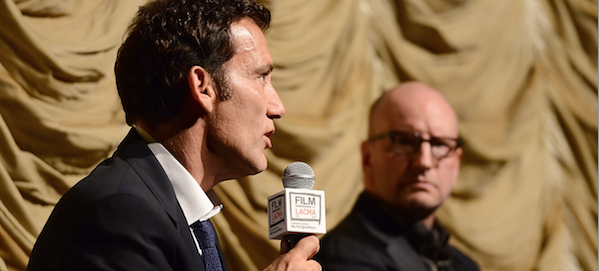Add Steven Soderbergh and Clive Owen to the list of lauded artists slipping through the permeable membrane between the worlds of film and television. August 8 marks Soderbergh’s first foray into the box that likely will never again be known as the “boob tube,” as The Knick premieres on Cinemax. Last night, Soderbergh and Owen joined Film Independent and New York Times Film Club members for a Film Independent at LACMA screening of the season’s first episode. “I got lit up,” Soderbergh said of his initial reaction to the script. “I was the first person to see it and I know the second person to see it would get lit up too, so I made the move,” he told Film Independent at LACMA curator Elvis Mitchell during the post-screening Q&A. Admitting he’d long wanted “desperately” to work with Soderbergh, Owen said he got the script while shooting a film and intended to read the first two pages in his trailer—“40 minutes later, I knew I had to do this.” Owen plays Dr. John Thackeray, a rogue surgeon experimenting at the boundaries of medical science at New York City’s Knickerbocker Hospital at the turn of the century. Both the actor and director appreciated the writers’ passionate attention to detail and authenticity. (The Knick was co-written by Jack Amiel and Michael Begler.) Soderbergh described a lengthy conversation about whether certain characters would use contractions in their speech. “That’s how granular it was.” The iconoclastic director who infamously un-retired from filmmaking, noted that the project also provided an irresistible refuge in the form of freedom. Soderbergh and Owen are the show’s executive producers. “You can focus on how to solve problems, as long as you don’t have someone calling you on the phone asking where’s your coverage.” That freedom, he said, allowed for the incredibly fast-paced production (In one case, he had one and a half hours to shoot one four-page scene. Another day called for 70 set-ups.) Soderbergh described directing as a zero sum game. Every day, you start with a number of 100. Every decision that you make that isn’t right, is one less from the 100 you get to make. “Everything had to go right,” he said, “and it felt like it did.” The Knick is unflinchingly gruesome and intense; Among many not-for-the-squeamish moments, the show’s first few minutes feature several close-ups of a bloody newborn. Much of the drama stems from the state of medicine at the time. When people went to the hospital in those days, Soderbergh pointed out, they went at a point when they were so sick that they went to the hospital fully expecting to die. Owen was open about the challenge of playing the mad genius, who swings wildly from brilliant and fearless feats of medical ingenuity to debilitating bouts with his addiction to liquid cocaine. In the opening episode, Thackeray also is revealed to be a racist, refusing to hire Dr. Algernon Edwards (Andre Holland), an African-American surgeon with an outstanding pedigree. “It’s challenging, dangerous and not easy,” said the actor, “and that’s what’s attractive about it.” “It has to be based on something. It can’t be arbitrary,” said Soderbergh of his main character’s overtly offensive traits. The Knick is in the red and racism is the norm: the hire is bad for business. “It has to come from somewhere that tracks,” explained Soderbergh. “He can’t be glib. It has to come from real beliefs based on his experience. He can’t be tossing off one-liners.” Soderbergh pointed to another key to any anti-hero’s appeal. “Proficiency is compelling. We are compelled by anybody who is exceptionally good at what they do.” Thackery also can be disarmingly charming and funny. In one scene, he tells a dying man about to have several inches of his intestine removed: “You will have the honor of evacuating your bowels several seconds faster than any of your friends.” Pamela Miller / Website & Grants Manager
